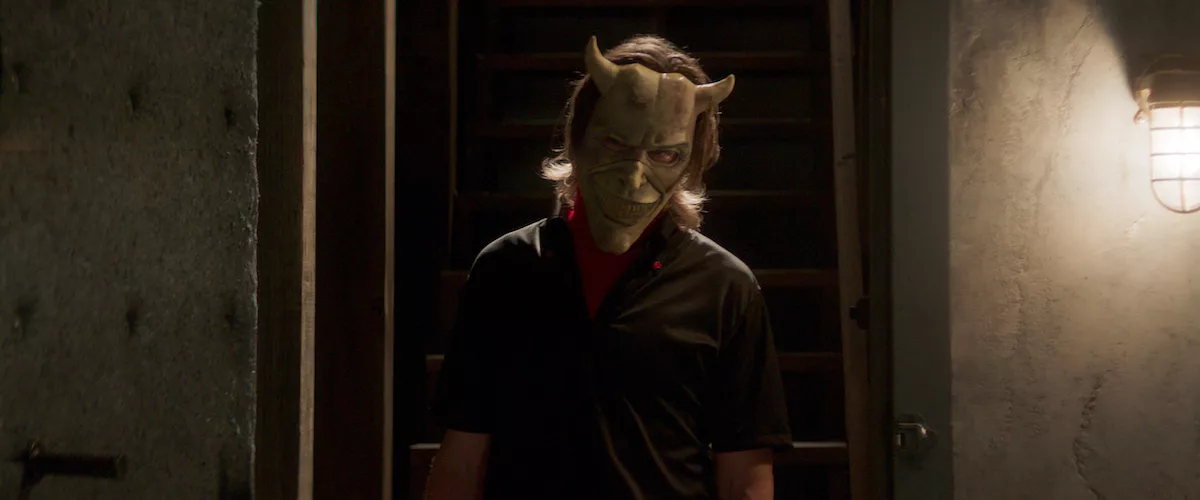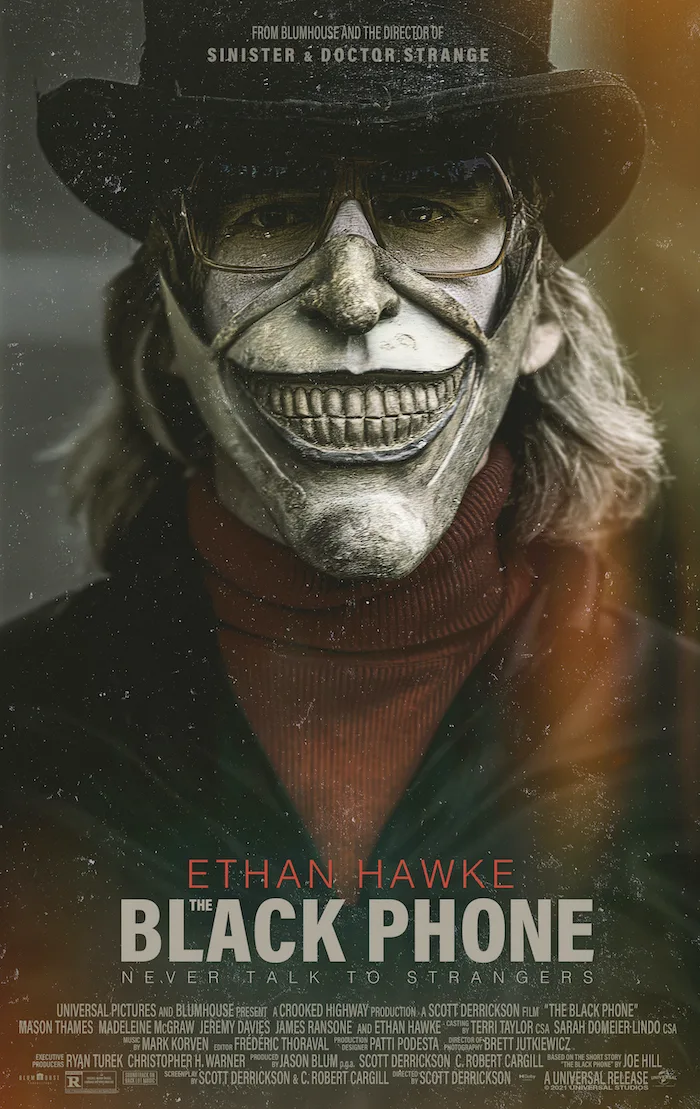The first time a film left me shivering in the dark and white-knuckling bedsheets was when I was 13, watching a slideshow of gore and brutality in Scott Derrickson’s “Sinister.” Even upon rewatch, after 10 years and the addition of countless horror movies to my watch log, it still makes me quiver.
Upon hearing of “The Black Phone,” a triple reunion with Derrickson, co-writer Robert Cargill, and star Ethan Hawke, I was filled with excited dread. Derrickson’s victims are tethered by their consequences. Where “Sinister” had them spun in a web inherent to their demise, “The Black Phone” connects its victims with a thread crucial to survival.
Based on the short story of the same name, written by Joe Hill, the son of Stephen King, “The Black Phone” chronicles a suspenseful tale of The Grabber, a child killer who snatches teen boys in broad daylight never to be seen again. When Finney (Mason Thames) becomes the next captive, held in a soundproof basement, he begins to receive phone calls from The Grabber’s previous victims through a disconnected landline.
Stylistically, the film is nostalgic, reminiscent of vintage photographs and the era of striped baby tees, flared jeans, and The Ramones. Warm browns and oranges, film grain, and filtered light flood the screen. But this idyllic ’70s suburbia is corrupted by Derrickson’s horror.
The only interruption of the otherwise consistent color scheme is the vibrancy of blood and the neon of police lights, making these moments all the more jarring. The weathered concrete of the basement is painted with brushstrokes of rust and blood: an evidential mural of violence unfettered. The upbeat ’70s soundtrack is interrupted by a bassy, resonant score that reverberates in your ribs, sinks into your eardrums, and at times sounds like you’re hearing it from underground in the Grabber’s basement. The film’s opening credits flash through nostalgic B-roll of the halcyon everyday occurrences of suburban youth—popsicles, baseball games, and sunny avenues—only to be interlaced with the vision of bloody knees and stacks of missing persons posters.
This juxtaposition of calm and collection being face forward while violence festers underneath is not only stylistic, but thematic. Timid Finney and his spunky sister Gwen (Madeleine McGraw), after dealing with belligerent bullies at school, go home to not be raised by their abusive alcoholic father. “I’ll look after Dad,” becomes a pattern of dialogue throughout the film, when Finney is left to return home while his sister stays with a friend. Son looks after father and siblings raise each other, kids protect each other from bullies while school staff is absent during adolescent brawls, Gwen (with her clairvoyant abilities) leads the police investigation, and past victims communicate with Finney while he’s in the clutches of a killer. It’s this commonality of a child-to-child support system in the absence of reliable adults that makes “The Black Phone” more than a simple story.
Derrickson and Cargill craft a nuanced, multi-layered narrative that takes horror elements and supports them with attentive discussion of cycles of abuse, trauma, and the bond of youth. Hawke’s Grabber is characterized by personality reversal. His faux-jolly disposition flaunts animated mannerisms and a high-pitched voice. It’s eerily childlike, hitching itself to a suggestion of trauma-based age regression behavior, and juxtaposing with the adult-like profanity and maturity with which the kids speak. But the zany harlequin act is fleeting, leaving Finney at the mercy of a total change: a husky, deep tone of voice and unforgiving, violent demeanor.
It’s in these moments where Hawke flexes his performance and versatility. His villainy is unpredictable and volatile. He expertly tiptoes a dissonant line of sprightly youthfulness and depravity. Switching on a dime, and with a mask covering the lower half of his face for most of the film, his acting relies on body language and the emotive flickers of his eyes. Though he was hesitant to play a villain, Hawke more than succeeds, and the emotional dramatic acting that’s laid the foundation for his celebrity translates perfectly to an adversarial role.
Though Hawke haunts the screen, it is the performances of the child actors that pack marrow into the bones of “The Black Phone.” The finesse with which Thames and McGraw seamlessly balance a wide range of emotions is a feat. Fear, anger, desperation, and indignation drizzle delicately into moments of youthful glee and adolescent comedy. The punchlines in “The Black Phone” are natural with how the film centralizes young teenagers.
Both Thames and McGraw receive moments of spotlight, and use every minute of individual attention to shred any emotional distance afforded by the screen. Yet some of the most poignant scenes occur in their wordless moments together, where they potently portray an airtight sibling bond in the face of abuse and adversity.
“The Black Phone” is a saga of support and resilience disguised as a semi-paranormal serial murderer flick. Underpinned by emotional performances across the board and a commanding atmosphere, “The Black Phone” aces its foundational qualities and allows its nuances to take control. The gore is secondary to the story, with character development taking first string, but by no means does the film neglect to thrill. Rather, it’s your care for Finney and the intensity of the film’s skillfully crafted suspense that draws your knees to your chest and your nails to your teeth.
Available in theaters tomorrow.




















